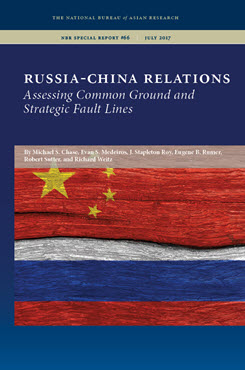Sino-Russian Security Ties
This essay analyzes the recent increase in Sino-Russian security ties by looking at a range of indicators, including arms sales, joint military exercises, and treaties, and discusses the impact on the U.S. and its allies.
EXECUTIVE SUMMARY
MAIN ARGUMENT
Chinese-Russian security collaboration has been expanding in several areas. In addition to their frequent senior-level political discussions on counterterrorism and regional security issues, China has been buying several more sophisticated weapons from Russia, including new warplanes and air defense systems. In addition, the two militaries have increased the pace of their joint exercises and defense dialogues. Whereas they used to hold one or two drills each year, they now conduct several ground and naval exercises annually. Shared security goals include averting bilateral conflicts, maintaining border security, facilitating arms sales, and influencing the U.S. and other parties. Regular Sino-Russian military exercises have since been a foundational tool for institutionalizing their defense ties. The leaders of both countries view their changed security relationship as a major success that they strive to sustain. Nonetheless, their mutual defense commitments are tenuous and their engagements remain below that found in a traditional military alliance.
POLICY IMPLICATIONS
- Chinese-Russian defense ties reinforce and complement other aspects of the bilateral relationship, which has remained focused on economic, energy, and nonsecurity issues.
- Russian arms sales to China allow both countries to circumvent Western sanctions, while the air and naval weapons systems that Russia is selling China would facilitate possible Chinese military operations against the U.S. and its Asian allies.
- The U.S. could proactively try to counter Sino-Russian security ties through more assertive policies—e.g., sanctions designed to limit the relationship. This strategy, however, risks driving China and Russia closer together instead of apart.
- For now, security relations between China and Russia remain considerably weaker than those between the U.S. and its main allies in Asia or Europe; in particular, there is little indication that Beijing and Moscow will soon enter a formal mutual defense alliance.
Richard Weitz is Senior Fellow and Director of the Center for Political-Military Analysis at the Hudson Institute.


